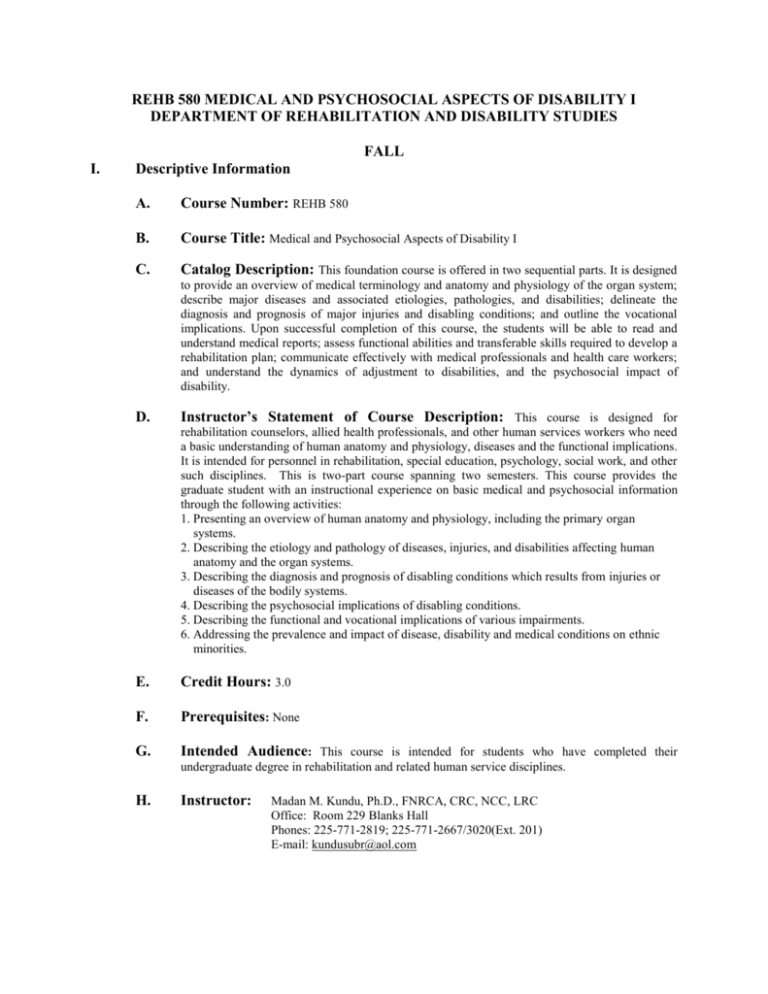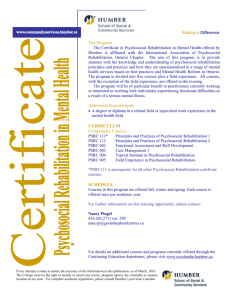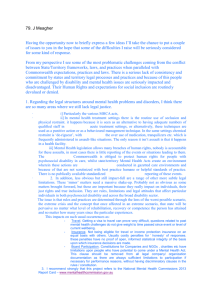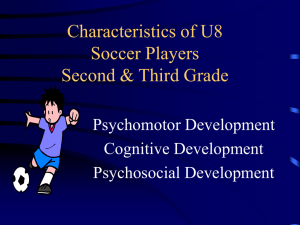course syllabus - Southern University, Baton Rouge
advertisement

REHB 580 MEDICAL AND PSYCHOSOCIAL ASPECTS OF DISABILITY I DEPARTMENT OF REHABILITATION AND DISABILITY STUDIES FALL I. Descriptive Information A. Course Number: REHB 580 B. Course Title: Medical and Psychosocial Aspects of Disability I C. Catalog Description: This foundation course is offered in two sequential parts. It is designed to provide an overview of medical terminology and anatomy and physiology of the organ system; describe major diseases and associated etiologies, pathologies, and disabilities; delineate the diagnosis and prognosis of major injuries and disabling conditions; and outline the vocational implications. Upon successful completion of this course, the students will be able to read and understand medical reports; assess functional abilities and transferable skills required to develop a rehabilitation plan; communicate effectively with medical professionals and health care workers; and understand the dynamics of adjustment to disabilities, and the psychosocial impact of disability. D. Instructor’s Statement of Course Description: This course is designed for rehabilitation counselors, allied health professionals, and other human services workers who need a basic understanding of human anatomy and physiology, diseases and the functional implications. It is intended for personnel in rehabilitation, special education, psychology, social work, and other such disciplines. This is two-part course spanning two semesters. This course provides the graduate student with an instructional experience on basic medical and psychosocial information through the following activities: 1. Presenting an overview of human anatomy and physiology, including the primary organ systems. 2. Describing the etiology and pathology of diseases, injuries, and disabilities affecting human anatomy and the organ systems. 3. Describing the diagnosis and prognosis of disabling conditions which results from injuries or diseases of the bodily systems. 4. Describing the psychosocial implications of disabling conditions. 5. Describing the functional and vocational implications of various impairments. 6. Addressing the prevalence and impact of disease, disability and medical conditions on ethnic minorities. E. Credit Hours: 3.0 F. Prerequisites: None G. Intended Audience: This course is intended for students who have completed their undergraduate degree in rehabilitation and related human service disciplines. H. Instructor: Madan M. Kundu, Ph.D., FNRCA, CRC, NCC, LRC Office: Room 229 Blanks Hall Phones: 225-771-2819; 225-771-2667/3020(Ext. 201) E-mail: kundusubr@aol.com II. Specification of Course Goals and Objectives A. Statement of General Goals: This two part class is designed to prepare master’s and doctoral students in rehabilitation, allied health, and human service fields in understanding medical and psychosocial consequences of various disabling conditions resulting from congenital deformities, illnesses and injuries. The students will be taught to assess functional abilities, transferable skills, and application of assistive technologies in developing individualized plan of employment leading to better placement outcomes for people with disabilities. B. Student Learning Outcomes: On completion of the course, the student will develop: 1. a proficiency and competence in understanding and using medical reference materials; 2. a professional interest in disabling conditions resulting from congenital deformities, illnesses, injuries impacting on psychosocial and vocational issues; 3. an ability to identify and understand appropriate medical and laboratory tests which are used to gain medical information; 4. an ability to utilize clinical medical data in an organize and logical sequence to determine the functional abilities in terms of rehabilitation potentials; 5. problem solving and decision making capabilities for obtaining additional medical work-ups needed to understand medical and psychosocial issues related to rehabilitation needs; and 6. a familiarity with and understanding of medical terminology for effective communication with physicians, specialists, and other health care workers. C. Statement of Course Content: Conceptually the content of this course covers physiology and anatomy; medical terminology; organ systems; disabling conditions due to birth defects, illness and injury; functional abilities; and vocational implications. III. Readings Textbooks: American Psychological Association. (2010). Publication manual of the American Psychological Association (6th ed.). Washington, DC: Author. Brodwin, M. G., Siu, F. W., Howard, J., & Brodwin, E. R. (2009). Medical, psychosocial and vocational aspects of dDisability (3nd ed.). Athens: Elliot & Fitzepatrick, Inc. Chan, F., Cardoso, E., & Chronister, J. (Eds.). (2009). Understanding psychosocial adjustment to chronic illness and disability: A handbook for evidence-based practitioners in rehabilitation. New York, NY: Springer . Thomas, C. L. (Ed.). (2009). Taber's cyclopedic medical dictionary (21st ed.). Philadelphia, PA: F.A. Davis Company. Supplementary Materials: Stolov, W. C., & Clowers, M. R. (Eds.). (1981). Handbook of severe disability. Rehabilitation Services Administration. Washington, D.C.: U.S. Government Printing Office. Course web sites of interest include the following: National Clearinghouse on Rehabilitation Training Materials National Rehabilitation Information Center (NARIC) National Center for Dissemination of Disability Research Medline ERIC National Library of Medicine http://www.nlm.nih.gov 1-888-FIND-NLM Other home pages of Research and Training Centers IV. Instructional Procedure: Instruction in this course consists of formal lectures, guest lectures, student-teacher discussions, student discussions, student presentations, and field visits. V. Course Requirements: A. Academic Requirements Abstracts: Two abstracts will be required for this course. The purposes of reading the journal articles and writing the abstracts are: to familiarize you with the medical and psychological aspects of disabilities; to assist you to gain more exposure in researching journal articles; to facilitate development of technical writing skills; and to foster development an idea for paper topics. You are to summarize the journal articles in your own words. The abstract should be written in American Psychological Association (APA) 5th Edition format, double spaced, and exactly two pages in length. More information about the format is in your class handout. You should submit two copies of your abstract and article (one will be retained, the other returned). The portions of the article used for compilation of the abstract must be properly highlighted. Field Visit Report: Mandatory Field Visits and submission of reports will constitute a portion of the final grade. Report for each field visit will be due on the second Monday following the visit. Any tardiness in submission will result in 10% deduction of the assigned grade. The two-page double space report will have L/R margin = 1.5"/1" and T/B margin = 1"/1". The first line of each paragraph should leave 5 spaces at the beginning. In the first page, the last name, first initial should be at the top right hand corner at 0.75". The second page should be numbered at the top right hand corner at 0.75". Field Visit = 5 points; Report = 5 points. Paper: Choose a particular area of disability from the topics that are being covered during that particular semester, the type of disability that interests you most, and the population you plan to work with during your practicum and internship experiences. The paper should follow the American Psychological Association (APA) 5 th Edition style and typed in double space citing appropriate references. Two copies of the paper should be submitted (one will be retained and the other returned). Please use regular typing paper (non-erasable). The copies of the articles used must be submitted (highlighted at appropriate places and arranged as they appear in the Reference) with the paper in a three-ring binder. Leave a margin of one inch at the top, bottom, and right side of the page; and one and a half inch on the left side of the page. The text of the paper should cover the topic adequately and not exceed 10 pages. A paper Grading Evaluation Format is attached to your class handout to make you aware as to what will be expected in the content and form of your paper. Presentation: Each student will make a 10 minute presentation on one of the psychosocial chapters using MS PowerPoint slides. The student will forward the presentation file for review by the instructor at least two weeks in advance. The presentation will be followed by class discussion on the topic. The assignment of the chapter will be made during the first class session. This is worth 10 points. Quizzes: Each student will be given four quizzes covering, i.e., two before and two after the Mid-Term Examination. Total points for four quizzes = 160. Examinations: Mid-Term and final examinations will be comprehensive in nature. They will be worth 100 each. Grading: Final grade will be composed of the following: A. B. C. D. E. F. G. H. I. Four class quizzes Mid-semester examination Final examination Two abstracts Field visits, attending seminars in rehabilitation, and report writing Attendance and class participation In class discussion on medical news from magazine, newspaper, and television In class presentation Emulation of a rehabilitation counselor role model Grading Scale: Grade A = 90% Grade B = 80% Grade C = 70% Grade D = 60% B. Administrative Requirements Students are expected to attend all class sessions, take all examinations, participate in all class activities, and complete all class assignments. All assignments must be submitted no later than a given date set by the instructor. C. Accommodations for Students with Disabilities The Office of Students with Disabilities located in Room 239 Blanks Hall. Please contact Ms. Patricia Hebert, Director for accommodation needs; Phone: 771-3950; Fax: 771-2959; and email: patricia_hebert@subr.edu. D. LiveText Subscription Southern University and A&M College-Baton Rouge has entered into partnership with LiveText, Inc. to provide online academic resources for student collaboration and learning outcomes assessment. Therefore, all students enrolled in this course are required to purchase a subscription from LiveText, Inc. through the Southern University Bookstore. LiveText, Inc. provides students with the electronic tools and services needed to serve them in their courses and in their career or academic pursuits beyond graduation. LiveText is a dynamic tool that will enable you to: Create Electronic Portfolios for storing and displaying coursework for use anytime and anyplace; Share your résumés, professional portfolios and virtually any projects that can be photographed, video recorded, and uploaded to prospective employers and others who need or want to know about your accomplishments; Engage in discussion boards with other students, exchange feedback, and create study groups and other types of social networks. Complete assignments in key/required courses where LiveText has been embedded (without LiveText, you will not be able to complete these assignments). Create a complete record of your academic career that is malleable and easily accessible. Engage in developing a results driven culture of assessment at Southern University. Participate in a process that will allow for data-driven curricular improvements that foster improved student learning and performance. 580 MEDICAL AND PSYCHOSOCIAL ASPECTS OF DISABILITY I FALL DR. M. M. KUNDU CLASS SCHEDULE Day 1 Introduction; Define: Disability, Handicap, Functional Limitation and Rehabilitation; Rehabilitation Counselor's needs for medical orientation; The structure and function of medicine in the U.S.; and Medical Specialties. Day 2 Medical: Medical Terminology, Prefixes and Suffixes, Prescription Abbreviations, Embryology. Brodwin: Chapter 3 Day 3 Medical: Physiology and Anatomy I: Cell, Tissue, Organ, Organ System, Musculoskeletal System, Nervous System: CNS, PNS, ANS. Film: Nervous System Brodwin: Chapter 2 Psychosocial: Chapter 1 Quiz - I Day 4 Labor Day Holiday Day 5 Physiology and Anatomy II: Brain, Cranial Nerves, Endocrine Glands, Cardiovascular System, Pulmonary System. Film: Brain, Heart, and Lung Brodwin: Chapter 2 Psychosocial: Chapter 2 Hand in First Abstract Day 6 Medical: Disability Consequences of Bed Rest, Medications, Psychosocial Adjustment to Chronic Disease and Disability Sexual Adjustment to Chronic Disease and Disability. Supplemental reading: Brodwin, Chapters 19 Psychosocial: Chapter 3 Quiz - II Day 7 Medical: Spinal Cord Injury Brodwin: Chapter 21 Guest Lecture: John Green, M.D., Physiatrist Medical Director, Rehabilitation Unit Our Lady of the Lake Regional Medical Center Psychosocial: Chapter 4 Day 8 MID-SEMESTER EXAMINATION Day 9 Medical: Neuromuscular Diseases Brodwin: Chapter 20 Psychosocial: Chapter 5 Hand in Second Abstract Day 10 Medical: Peripheral Neuropathies, Multiple Sclerosis Brodwin: Chapters 23 Psychosocial: Chapter 6 Field Visit: National Hansen’s Disease Center Summit Hospital Day 11 Medical: Stroke and Cerebral Trauma Brodwin: Chapter 16 Psychosocial: Chapter 7 QUIZ - III Day 12 Medical: Traumatic Brain Injury Brodwin: Chapter 15 Psychosocial: Chapter 8 Field Visit: Health South Rehabilitation Hospital of Baton Rouge Rehabilitation Unit, OLOL Day 13 Medical: Cerebral Palsy Epilepsy Brodwin: Chapter 22 & 17 Quiz - IV Day 14 Psychosocial: Chapter 9 Review for Final Examination Thanksgiving Holiday Day 15 FINAL EXAMINATION





